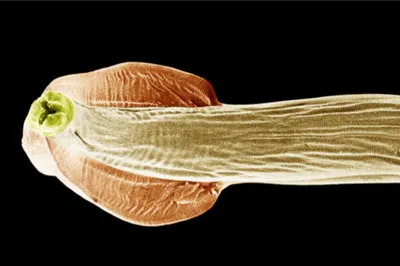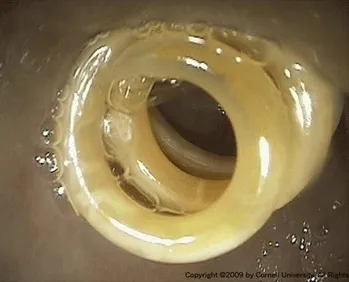Roundworms are a remarkably common internal parasite, affecting almost all dogs at some point in their lives, particularly during puppyhood. As a responsible pet owner, it’s natural to wonder, “Can you catch roundworm from a dog?” The direct answer is yes, humans can indeed contract roundworms from dogs, making awareness and proactive prevention paramount for the health and safety of both your beloved pet and your family. These resilient parasites spread through various avenues, underscoring the importance of understanding their life cycle and implementing effective control measures. This comprehensive guide will delve into how dogs contract roundworms, the symptoms they may exhibit, crucial prevention strategies, and most importantly, the significant risks these parasites pose to human health. Effective best flea and worm treatment for dogs often includes components that target roundworms, forming a critical part of a comprehensive parasite control strategy.
Understanding Roundworms: A Common Canine Parasite
Roundworms, specifically Toxocara canis, are among the most prevalent parasitic worms found within the canine population. Their ability to spread easily through multiple routes makes them a persistent challenge for pet owners. From the moment of birth, a puppy can be infected with roundworms, as the mother dog often transmits the larvae to her offspring while they are still in utero. This prenatal transmission is a major reason why young puppies are so frequently affected.
Beyond birth, puppies and adult dogs can acquire roundworms by ingesting larvated eggs present in contaminated soil or feces in their environment. These microscopic eggs are incredibly hardy and can survive in the soil for extended periods. Another common method of transmission occurs when a puppy drinks worm larvae through its mother’s milk, particularly if the mother herself carries the infection. Furthermore, dogs can become infected by consuming small mammals, such as mice, that harbor roundworm larvae in their tissues. Understanding these varied transmission routes is crucial for developing an effective prevention plan. Many reputable best worm flea and tick treatment for dogs options offer broad-spectrum protection against these and other common parasites.
 Detailed microscopic view of a roundworm's anterior section
Detailed microscopic view of a roundworm's anterior section
Symptoms and Effects on Your Dog
Once inside your dog’s intestines, adult roundworms can lead to a range of health issues, though the severity often depends on the extent of the infection and the dog’s age. Many adult dogs with minor infections may show no outward signs, making regular veterinary check-ups essential. However, dogs with significant roundworm burdens, especially puppies, frequently exhibit noticeable symptoms. These can include persistent diarrhea, vomiting, noticeable weight loss despite a normal appetite, and a dull, unhealthy coat. A classic sign of a heavy roundworm infection in puppies is a distended or “pot-bellied” appearance, even if the puppy is otherwise thin. If the roundworm larvae migrate through the body and reach the lungs, the dog may also develop a cough. In some cases, owners may even observe the adult roundworms in their dog’s feces or vomit; these worms typically appear white or light brown and can be several inches long, resembling spaghetti.
Preventing Roundworm Infection in Your Canine Companion
Given the various ways roundworms can enter a dog’s body, a multi-faceted approach to prevention is essential. Maintaining a clean and hygienic environment for your dog is fundamental. This means regularly cleaning their living areas, promptly removing feces from your yard, and, where possible, preventing your dog from hunting and consuming wild animals like rodents that could be carriers. Good sanitation significantly reduces the number of infective eggs in the environment.
Deworming Protocols for Puppies and Adult Dogs
To effectively combat roundworms, particularly those passed from the mother, puppies require a strict deworming schedule. It is generally recommended that puppies be treated at 2, 4, 6, and 8 weeks of age. Following this initial series, they should receive a monthly preventive treatment. Regular fecal (stool) examinations are also critical; these should be conducted 2 to 4 times during the first year of life and at least once or twice a year for adult dogs. These examinations allow your veterinarian to detect the presence of worm eggs, even if no visible symptoms are present, and tailor treatment accordingly. For a more natural approach to general pet health, some owners explore home remedies for dog mites on skin, though for internal parasites like roundworms, veterinarian-prescribed medications are typically most effective.
Nursing mothers should also be kept on a monthly preventive treatment and dewormed along with their puppies. This practice is crucial for decreasing the risk of roundworm transmission to the vulnerable litter. Many commercially available heartworm preventives offer the added benefit of controlling common intestinal parasites, including roundworms. Always consult your veterinarian to discuss the most appropriate prevention and treatment choices tailored to your dog’s specific needs, lifestyle, and local parasite prevalence.
 Numerous adult roundworms visible within a dog's small intestine
Numerous adult roundworms visible within a dog's small intestine
The Zoonotic Risk: Can Humans Catch Roundworms from Dogs?
This is a critical question for many pet owners, and the answer is a definitive yes: roundworms do pose a significant risk to humans, especially young children. This means that if you have dogs, you could potentially catch roundworms from them. Human infection typically occurs through accidental ingestion of microscopic roundworm eggs. These eggs may accumulate in substantial numbers in soil where infected pets have deposited feces. Direct contact with such contaminated soil or dog feces can lead to ingestion and subsequent infection in people.
Once ingested, the roundworm larvae can migrate through various tissues in the human body, a condition known as visceral larval migrans. Depending on where these larvae travel, they can cause serious health issues. People infected with roundworms may experience eye problems (ocular larval migrans), lung issues, and in more severe or rare cases, heart and neurological signs. The severity of symptoms often depends on the number of larvae ingested and their migration path. To understand the broader spectrum of parasite transmission, it’s worth noting that can you get ear mites from dogs is another common concern for pet owners, highlighting the importance of overall parasite control.
Crucial Hygiene Practices
Protecting human health, particularly that of children, requires vigilant hygiene. Children should not be allowed to play in areas where animals have passed feces, especially in public parks, sandboxes, or unvaccinated yards. Regularly cleaning up pet waste immediately after your dog defecates is vital to prevent eggs from contaminating the environment. Individuals who have direct contact with soil that may have been contaminated by dog or cat feces should always wear gloves to minimize exposure and wash their hands thoroughly with soap and water immediately afterward. Proper hand hygiene is one of the most effective ways to prevent accidental ingestion of these resilient eggs. For related concerns about external parasites, home remedies for ear mites in cats and dogs information can provide additional insights into maintaining pet health.
Conclusion
Roundworms are a ubiquitous parasite in the canine world, posing a substantial risk not only to our beloved pets but also to human health. The question, “Can you catch roundworm from a dog?” is answered with a clear affirmative, underscoring the vital need for proactive prevention and meticulous hygiene. By understanding the various modes of transmission, recognizing the symptoms in dogs, and implementing comprehensive deworming schedules for puppies and adults, pet owners can significantly reduce the prevalence of these internal parasites. Vigilant environmental sanitation, prompt waste removal, and careful handwashing are indispensable practices to protect both your furry companions and your family from the potential dangers of roundworm infection. Always consult your veterinarian to establish the most effective and tailored parasite prevention plan for your dog, ensuring a healthier, safer home for everyone.
References
- Pets & Parasites: The Pet Owner’s Guide to Parasite Prevention. (n.d.). Retrieved from https://www.petsandparasites.org/
- Companion Animal Parasite Council (CAPC). (n.d.). Ascarid Guidelines. Retrieved from https://www.capcvet.org/guidelines/ascarid/
